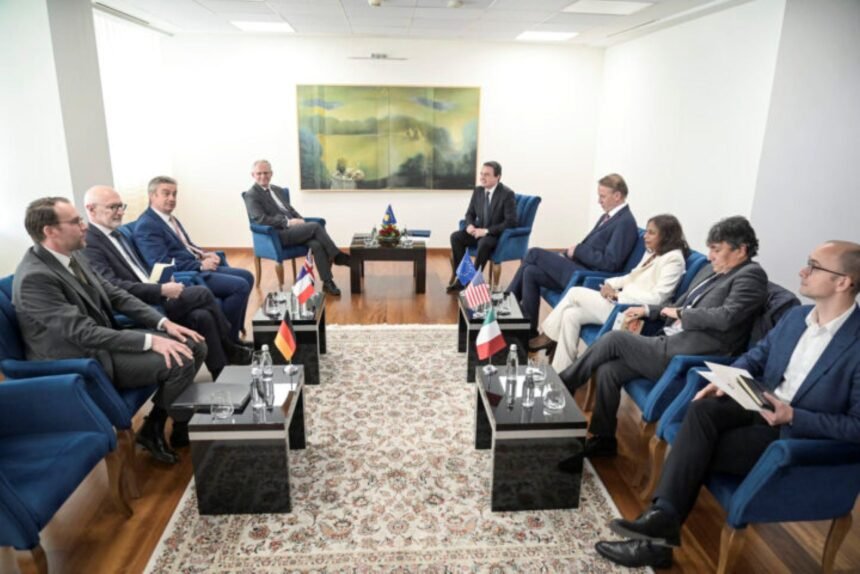On May 12, 2025, a meeting took place in the Kosovo Government building between acting Prime Minister Albin Kurti and the ambassadors of the QUINT countries. However, the interpretations of the meeting were completely different from the perspectives of the Kosovo government and the ambassadors.
Government’s Statement
The Kosovo government focused on the consequences of the delay in the country’s membership process in international organizations, such as the Council of Europe and the European Union. The government did not mention the underlying cause—the delay in forming the new government institutions. Shortly after the meeting, the government issued a brief statement highlighting Kosovo’s longstanding desire to join the Council of Europe. However, the statement did not address the urgent need for the formation of a new government, a topic that dominated the discussions according to the ambassadors.
According to the Prime Minister’s office, Kurti reminded the ambassadors that the Parliamentary Assembly of the Council of Europe and the rapporteur for Kosovo’s membership, Dora Bakoyannis, had confirmed that Kosovo meets the legal and institutional criteria to be part of this important international body.
Ambassadors’ Statements
In stark contrast, the German ambassador, Jörn Rohde, who was at the meeting, highlighted that Kosovo needs a stable government capable of making decisions. He emphasized that the country urgently requires a government that can take on both domestic and international tasks. He pointed out that this message was conveyed by the QUINT ambassadors during the meeting with acting Prime Minister Kurti.
Similarly, Anu Prattipati, the Chargé d’Affaires of the U.S. Embassy, confirmed that the formation of a new government was the main topic of the meeting. The U.S. stressed that Kosovo’s political leaders need to work together to convene the Assembly and form a stable government in line with the Constitution.
The EU Ambassador Aivo Orav directly warned that the status quo benefits no one, particularly not Kosovo’s European integration. He underscored that for Kosovo’s European integration to progress, a stable and functional government is needed, as the current situation impedes progress. French Ambassador Olivier Guerot echoed similar sentiments, stating that without a new government, European integration would not move forward.
The Need for Urgent Action
The Italian Ambassador Maurizio Antonini also emphasized that Kosovo must form a new government quickly in order to proceed with its Euro-Atlantic integration priorities.
Kosovo faces significant consequences if it does not overcome the institutional deadlock resulting from the failure to form a government. Every day lost hampers progress in the integration processes and delays the receipt of millions of euros in EU funding.
As of April 15, there have been 15 unsuccessful attempts to convene the Assembly, which is a crucial step towards forming a new government. Kosovo has also not been included in the Committee of Ministers’ agenda of the Council of Europe.
Setbacks in Kosovo’s European Path
In February of last year, the Kosovo government decided to implement a Constitutional Court ruling regarding the property of the Dečani Monastery, which was a condition for Council of Europe membership. After this decision, Kosovo received two green lights but was caught in a third “trap”. The demand for the establishment of the Association of Serb-majority Municipalities held Kosovo back from the Council of Europe’s agenda.
Some member states requested the submission of the draft-statute for the Association, which was seen as a necessary step to secure the support of the majority of Council of Europe member states for Kosovo’s membership. Kosovo’s failure to send the draft statute for interpretation by the Constitutional Court, as required by the European Union, led to Kosovo being excluded from the Council of Europe’s agenda meeting on May 17, 2024.







